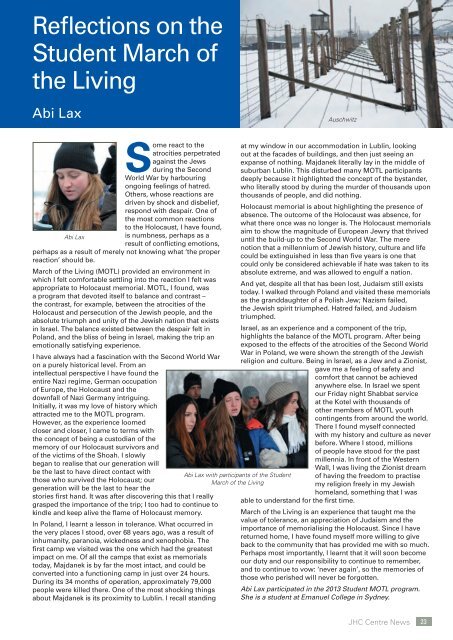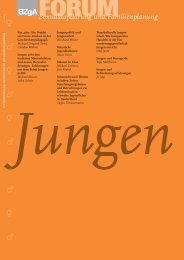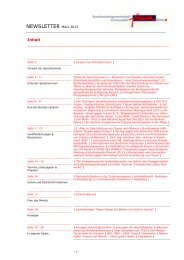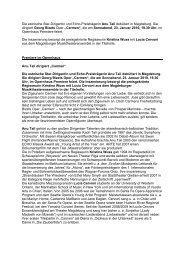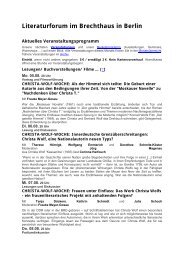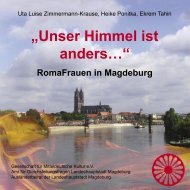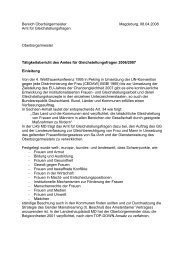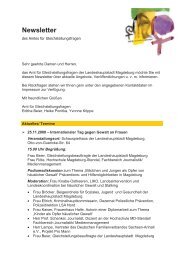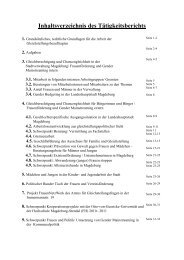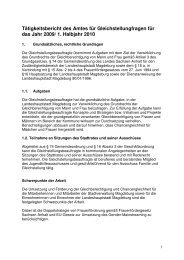Raoul Wallenberg becomes Australia's first honorary citizen
Raoul Wallenberg becomes Australia's first honorary citizen
Raoul Wallenberg becomes Australia's first honorary citizen
You also want an ePaper? Increase the reach of your titles
YUMPU automatically turns print PDFs into web optimized ePapers that Google loves.
Reflections on the<br />
Student March of<br />
the Living<br />
Abi Lax<br />
Auschwitz<br />
Some react to the<br />
atrocities perpetrated<br />
against the Jews<br />
during the Second<br />
World War by harbouring<br />
ongoing feelings of hatred.<br />
Others, whose reactions are<br />
driven by shock and disbelief,<br />
respond with despair. One of<br />
the most common reactions<br />
to the Holocaust, I have found,<br />
Abi Lax<br />
is numbness, perhaps as a<br />
result of conflicting emotions,<br />
perhaps as a result of merely not knowing what ‘the proper<br />
reaction’ should be.<br />
March of the Living (MOTL) provided an environment in<br />
which I felt comfortable settling into the reaction I felt was<br />
appropriate to Holocaust memorial. MOTL, I found, was<br />
a program that devoted itself to balance and contrast –<br />
the contrast, for example, between the atrocities of the<br />
Holocaust and persecution of the Jewish people, and the<br />
absolute triumph and unity of the Jewish nation that exists<br />
in Israel. The balance existed between the despair felt in<br />
Poland, and the bliss of being in Israel, making the trip an<br />
emotionally satisfying experience.<br />
I have always had a fascination with the Second World War<br />
on a purely historical level. From an<br />
intellectual perspective I have found the<br />
entire Nazi regime, German occupation<br />
of Europe, the Holocaust and the<br />
downfall of Nazi Germany intriguing.<br />
Initially, it was my love of history which<br />
attracted me to the MOTL program.<br />
However, as the experience loomed<br />
closer and closer, I came to terms with<br />
the concept of being a custodian of the<br />
memory of our Holocaust survivors and<br />
of the victims of the Shoah. I slowly<br />
began to realise that our generation will<br />
be the last to have direct contact with<br />
those who survived the Holocaust; our<br />
generation will be the last to hear the<br />
stories <strong>first</strong> hand. It was after discovering this that I really<br />
grasped the importance of the trip; I too had to continue to<br />
kindle and keep alive the flame of Holocaust memory.<br />
In Poland, I learnt a lesson in tolerance. What occurred in<br />
the very places I stood, over 68 years ago, was a result of<br />
inhumanity, paranoia, wickedness and xenophobia. The<br />
<strong>first</strong> camp we visited was the one which had the greatest<br />
impact on me. Of all the camps that exist as memorials<br />
today, Majdanek is by far the most intact, and could be<br />
converted into a functioning camp in just over 24 hours.<br />
During its 34 months of operation, approximately 79,000<br />
people were killed there. One of the most shocking things<br />
about Majdanek is its proximity to Lublin. I recall standing<br />
Abi Lax with participants of the Student<br />
March of the Living<br />
at my window in our accommodation in Lublin, looking<br />
out at the facades of buildings, and then just seeing an<br />
expanse of nothing. Majdanek literally lay in the middle of<br />
suburban Lublin. This disturbed many MOTL participants<br />
deeply because it highlighted the concept of the bystander,<br />
who literally stood by during the murder of thousands upon<br />
thousands of people, and did nothing.<br />
Holocaust memorial is about highlighting the presence of<br />
absence. The outcome of the Holocaust was absence, for<br />
what there once was no longer is. The Holocaust memorials<br />
aim to show the magnitude of European Jewry that thrived<br />
until the build-up to the Second World War. The mere<br />
notion that a millennium of Jewish history, culture and life<br />
could be extinguished in less than five years is one that<br />
could only be considered achievable if hate was taken to its<br />
absolute extreme, and was allowed to engulf a nation.<br />
And yet, despite all that has been lost, Judaism still exists<br />
today. I walked through Poland and visited these memorials<br />
as the granddaughter of a Polish Jew; Nazism failed,<br />
the Jewish spirit triumphed. Hatred failed, and Judaism<br />
triumphed.<br />
Israel, as an experience and a component of the trip,<br />
highlights the balance of the MOTL program. After being<br />
exposed to the effects of the atrocities of the Second World<br />
War in Poland, we were shown the strength of the Jewish<br />
religion and culture. Being in Israel, as a Jew and a Zionist,<br />
gave me a feeling of safety and<br />
comfort that cannot be achieved<br />
anywhere else. In Israel we spent<br />
our Friday night Shabbat service<br />
at the Kotel with thousands of<br />
other members of MOTL youth<br />
contingents from around the world.<br />
There I found myself connected<br />
with my history and culture as never<br />
before. Where I stood, millions<br />
of people have stood for the past<br />
millennia. In front of the Western<br />
Wall, I was living the Zionist dream<br />
of having the freedom to practise<br />
my religion freely in my Jewish<br />
homeland, something that I was<br />
able to understand for the <strong>first</strong> time.<br />
March of the Living is an experience that taught me the<br />
value of tolerance, an appreciation of Judaism and the<br />
importance of memorialising the Holocaust. Since I have<br />
returned home, I have found myself more willing to give<br />
back to the community that has provided me with so much.<br />
Perhaps most importantly, I learnt that it will soon become<br />
our duty and our responsibility to continue to remember,<br />
and to continue to vow: ‘never again’, so the memories of<br />
those who perished will never be forgotten.<br />
Abi Lax participated in the 2013 Student MOTL program.<br />
She is a student at Emanuel College in Sydney.<br />
JHC Centre News 23


